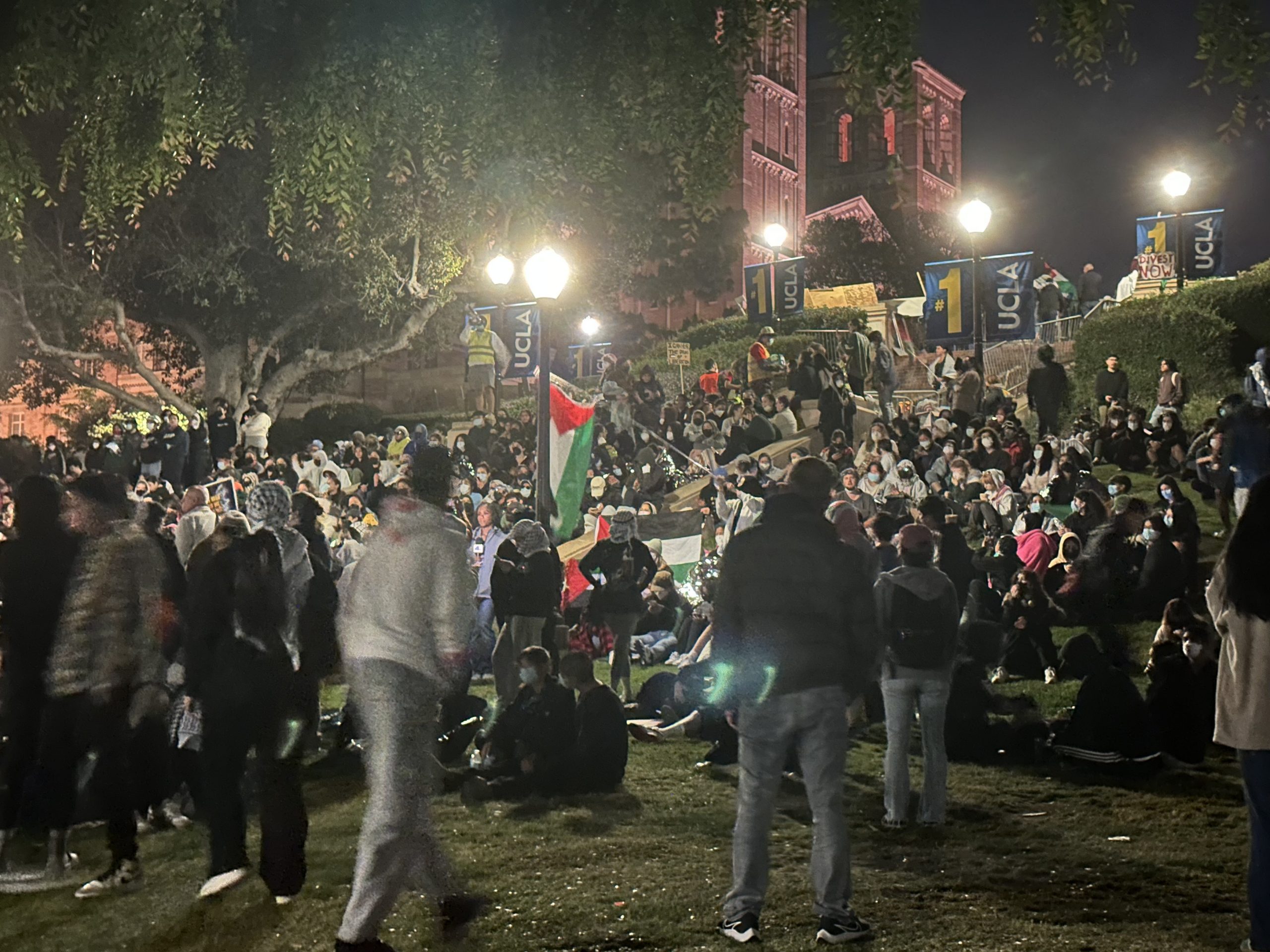Sarah Belew/OutWrite
Content warning: discussions of police violence.
On August 19 in the wake of student protests, UC President Michael V. Drake directed UC chancellors to ban masks at the discretion of law enforcement. He justified the policies with an appeal to maintaining the status quo and preserving order in the wake of Palestinian liberation protests and encampments.
UCLA released its own adaptation of Drake’s proposed Time, Place and Manner Policies for protests on September 6. Although it removed language explicitly highlighting masks, it still bans anything that will “conceal your identity with the aim of intimidating any person or group,” which encompasses nearly all masks.
In a meeting with other UCLA officials and USAC officers, Associate Vice Chancellor of Campus Safety Rick Braziel reinforced UCLA’s anti-mask message by falsely claiming that masks are unlawful during protests. Under California law, masks are legal except when fleeing arrest or actively committing a crime. Protesters should enjoy the full protection of the law — including the ability to wear masks.
Neither Drake’s statement nor UCLA’s policy mention the marginalized students harmed by the decree against masks, or the harms historically perpetrated by disproportionate police violence against these communities.
Immunocompromised students’ health is in danger if they and their peers are speciously forced to remove their masks. UCLA’s Disabled Student Union therefore recommends masking as often as possible against COVID-19 and other infectious diseases. Masks are also necessary protection against smog and wildfire smoke, particularly for people with damaged or poorly functioning lungs. Simultaneously, disabled people are over one-third of those murdered by the police. Encouraging police to force students to remove their masks places disabled students in the double-bind of facing deadly illness and police violence.
Directing police to harass disabled people also paints a target on the queer community’s back: LGBTQ+ people are more likely to have a disability than straight, cisgender people, while also being disproportionately likely to experience police violence. Racist policing means that Black and Brown people— who are already more likely to be disabled— are at even higher risk of police violence.
The ban on masks also carries Islamophobic undertones. As the UCSD Muslim Student Association highlighted in an Instagram post, a mask ban places Muslim women who wear niqabs at risk, reinforcing embedded cultural Islamophobia. Muslims already face extraordinary levels of suspicion and surveillance from police. Drake’s directive further empowers these tendencies.
Empowering police to harass some marginalized students creates a climate of fear which harms all marginalized students and their associates, including the overlapping communities of disabled, Muslim and/or LGBTQ+ students.
Given LA’s historical and ongoing experience with police violence, it is unconscionably irresponsible to allow cops and private security to decide when an individual is “intimidating” and thus not allowed to mask. When police are called upon to determine the intent behind an action with multiple possible interpretations, they frequently respond with random violence. Just the threat of a hostile interaction with police, then, creates a chilling effect on all mask-wearing, which is particularly deadly while COVID rips through California on a monthly basis.
Drake’s statement signals his approval of the police tactics used against student protestors at the encampment— including removing students’ masks directly in front of news cameras. Without any official pushback, police will inevitably continue their threats, harassment and violence against campus protests with masked students they find “intimidating.”
American police have been intimidated by everything from routine traffic stops to pouring out a pot of water to, yes, peaceful student protestors. Allowing police discretion in determining when a student is hostile will inevitably result in the stifling of constitutionally protected speech. Disabled students, Muslim students and other marginalized groups are already excluded from decision-making processes; now Drake has moved to exclude them from protests with the threat of violence.
By weaponizing police directly against masked, marginalized students, Drake can preserve the power of his institution at the expense of the students that the institution is meant to serve. At the same time as he justifies his directive with the need to continue “orderly operations” at universities, he disregards the disruption he will cause to students’ expressions of faith, mental health and potentially their lives.
UCLA Professor and historian of resistance Robin D. G. Kelley puts it well: police convey the state’s monopoly on violence down to the sidewalk-level. UCLA has encouraged police to use violence against marginalized students who are trying to protect community health, express their faith, or simply argue in public for justice and truth.
Credits:
Author: JQ Shearin (They/Them)
Photographer: Sarah Belew (She/Her)

